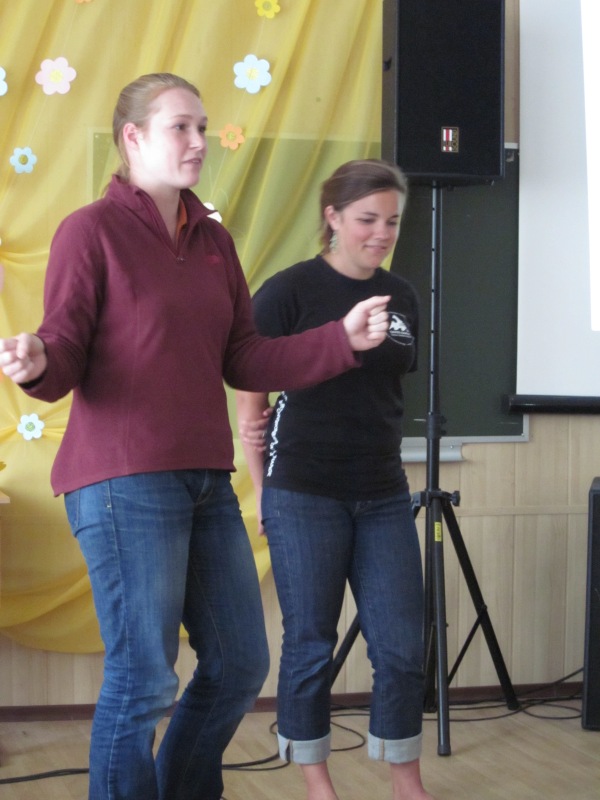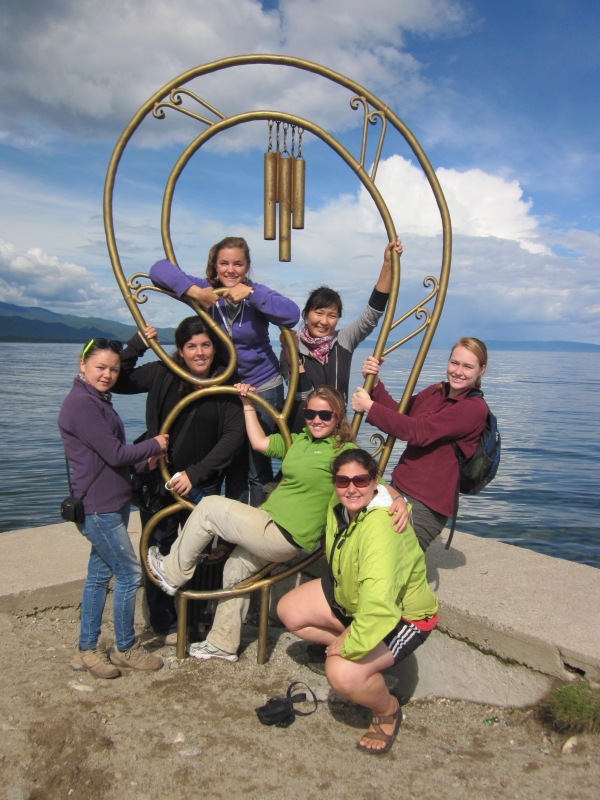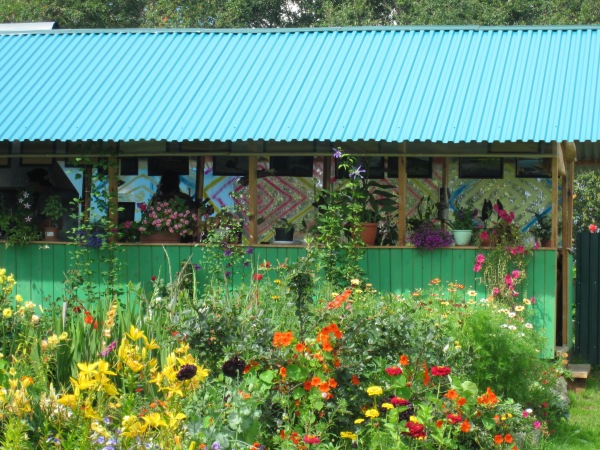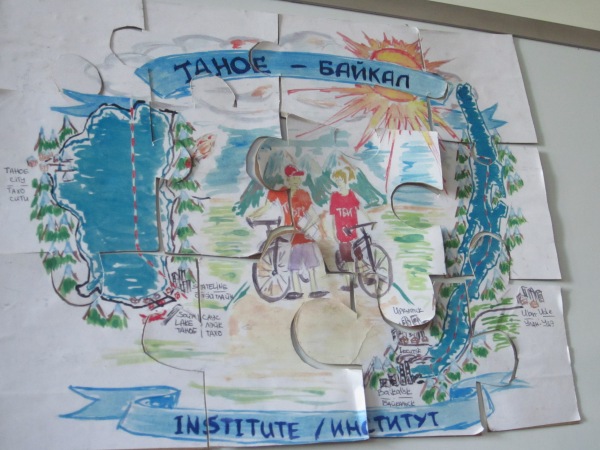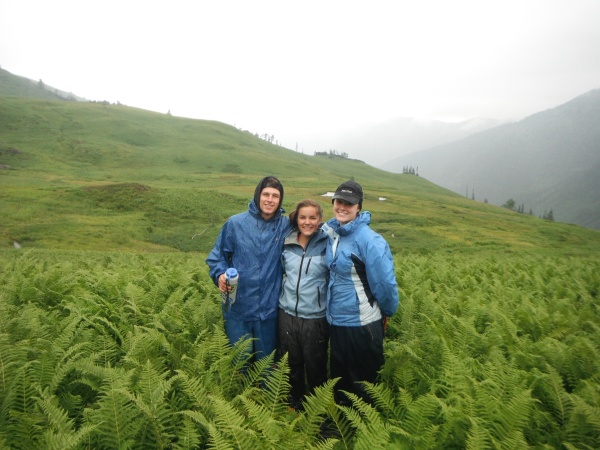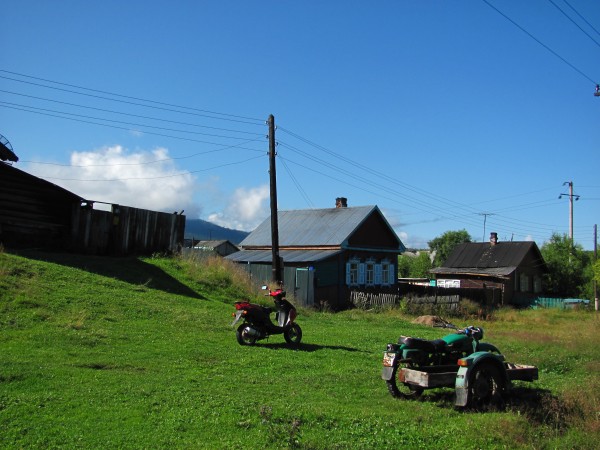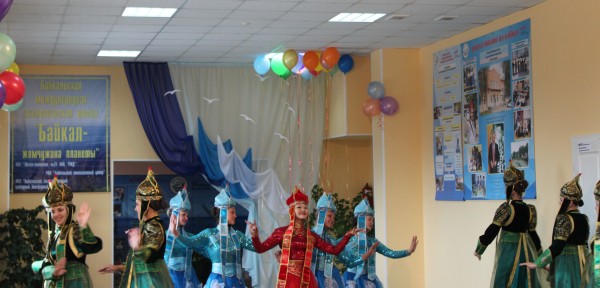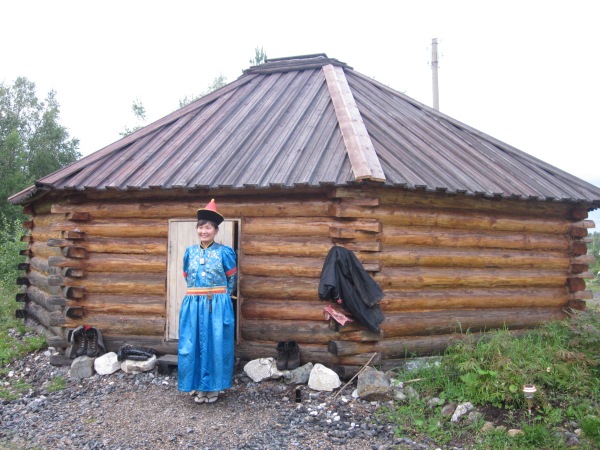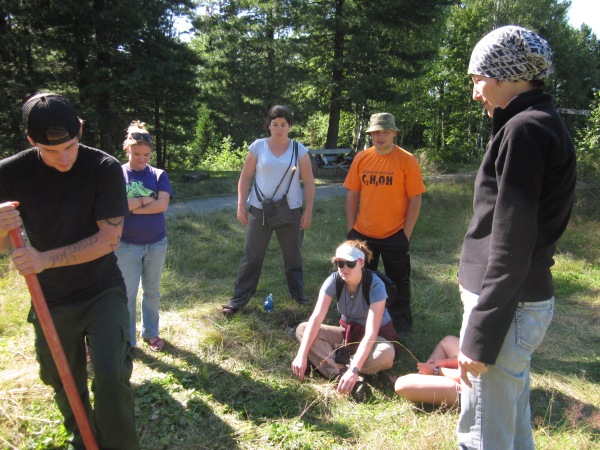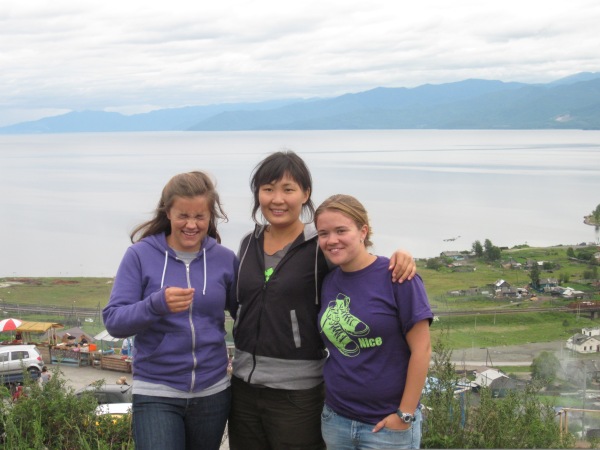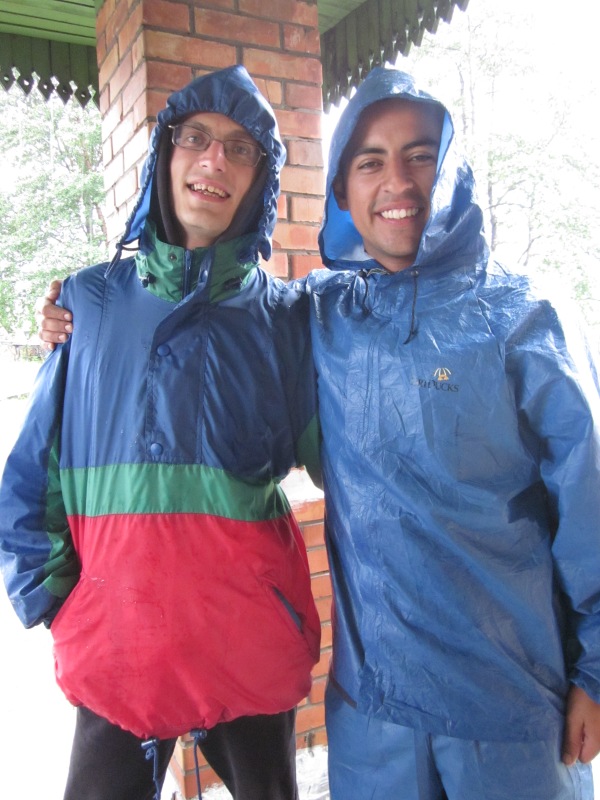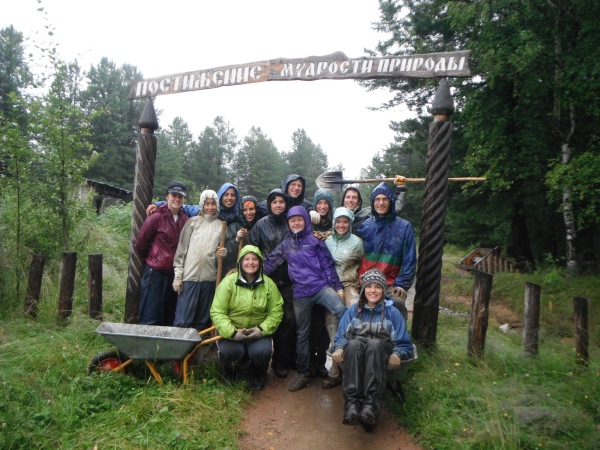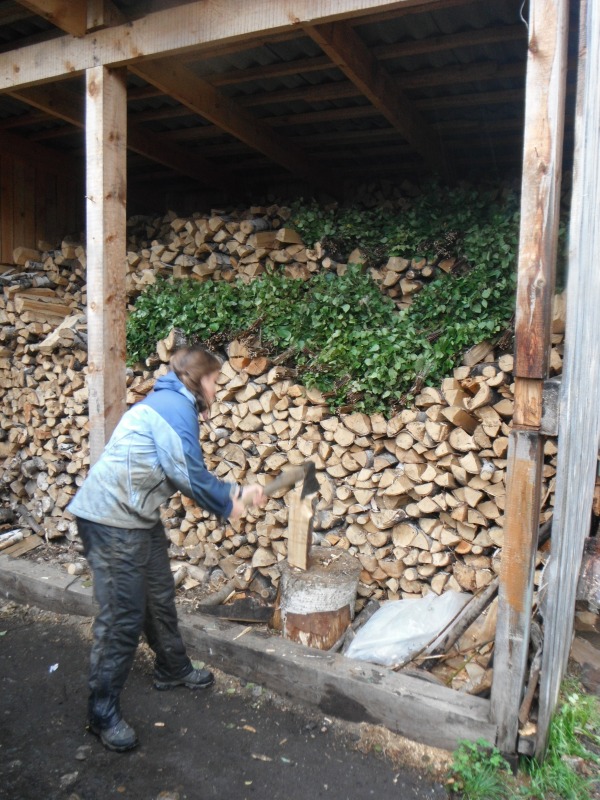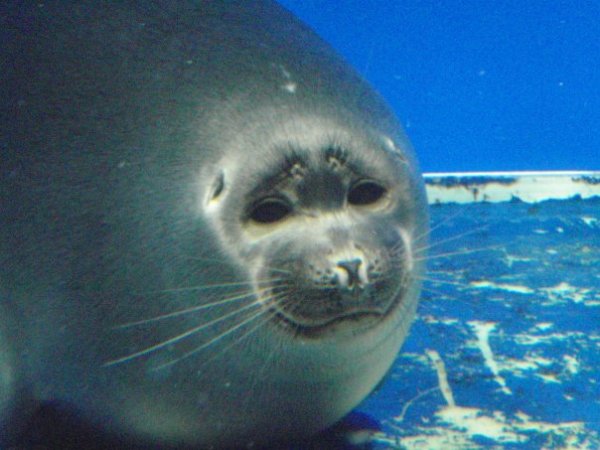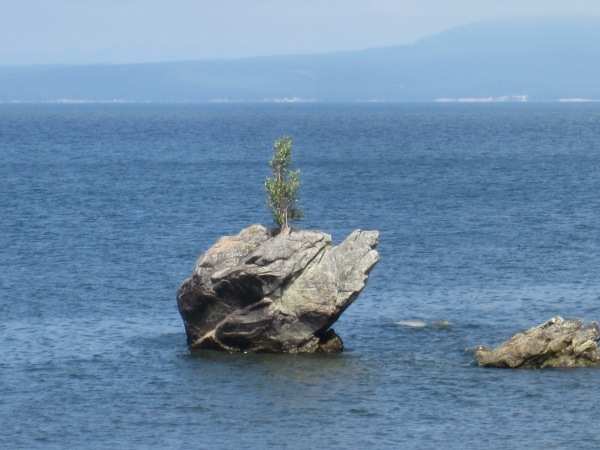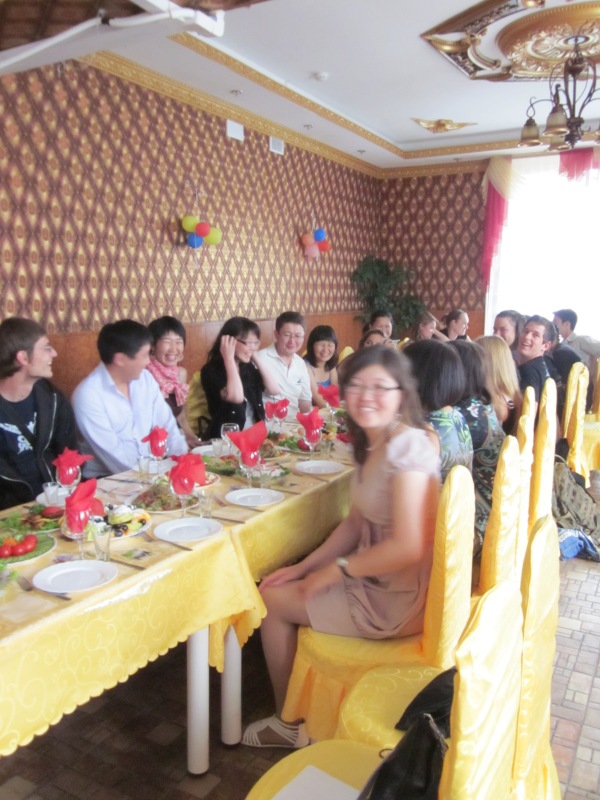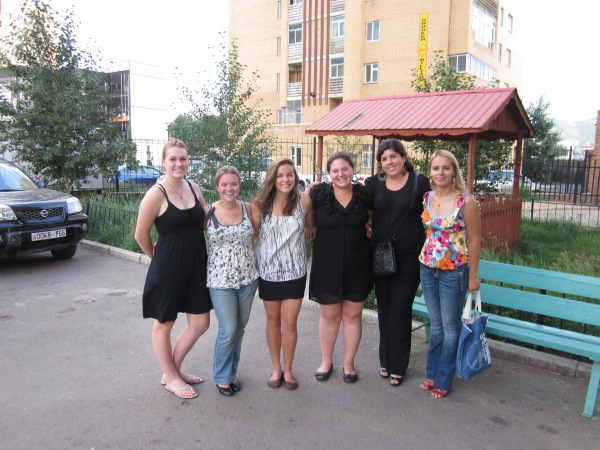The Bittersweet End
The final blog post. Wow. Hard to believe it is over. Let me give you all of the news and stories then reflect a little on my experience. Our experience.
The project presentations went incredibly well. Employees from the preserve, project leaders and all of us that were directors/coordinators of the program were extremely impressed. They put in two weeks of work in one, took the experience very seriously and really worked hard to analyze their data and create a good final product for the preserve. This is the second year in a row TBI has done an integrated research project with the Baikalski Preserve and I know that all of their research will be used in the near future to make improvements and properly develop eco-tourism in the area. Here are some pictures from the presentations.
The presentations were followed by a celebratory dinner with omul, fruit plates and caramel cake. We had a final thematic seminar on pollution, went over the logistics for the last few days and ended our last night in Tankhoi with a Bonfire on the shore of Lake Baikal.
The next day we had an excursion to the infamous town of Baikalsk, home of the most delicious Siberian strawberry and the pulp and paper mill. We first met with a local public official who carried on about their growing tourism and made the mill sound like an almost nonexistent blemish on their perfect town instead of a main source of point pollution for both the water and the air. And it did smell pretty bad. She claimed that the mill was destined to close again in 2015 for good—highly unlikely.
We then got a tour of the local ski area—the only one in the region and it was somewhat interesting, but the woman refused to speak of their revenue, how they contributed to the local economy monetarily or how they related to the health of the lake. It was a good comparison in some ways to show the difference between the lake side ski industry here and in Tahoe.
Our last stop was in the neighboring village of Utulik at the garden and arts center of an adorable old Siberian man, Anatoli. He has one of the most beautiful gardens I have ever seen, which include water/pond models of both Lake Baikal and Lake Tahoe. He is also a very skilled painter and really captures the beauty of the Baikal region and Siberia more generally. We also got to view his fish tanks which included an extremely bloated, alien-like African frog and an ancient turtle that looks like a dinosaur—very similar to the one in the movie the Never-ending Story.
Once back in Irkutsk, everyone headed to their final home-stays and said goodbye to Alina. All of the staff and lucky Tony joined her for a final business dinner discussing future collaboration, new projects etc. She then bought us a few drinks at London Pub and we said our goodbye also.
The next day Igor and Vera’s niece, Natalia, gave the group a tour of the city while we prepared their certificates, evaluations and final synthesis seminar. In the afternoon we all met and discussed the Russia program, while also sharing themes present in all three countries that both separated them and united them, shared our favorite program memories and shared what each of us thought we would take away from the experience. It was very well articulated and genuine. They also received their last puzzle piece (one was awarded after each seminar) to complete the SEE 2011 Puzzle.
We then hurried (one hour late—we like to talk a lot) to our farewell dinner and dance party at a Japanese restaurant/club called the attic where we enjoyed tempura, sushi lots of veggies. It was quite the crowd there with us, almost 90% women and we enjoyed the music of a live cover band.
Our last day together we took a trip to Tantsi, a cultural tourism site that displays many aspects of this area’s history, including traditional homes of the native tribes, Buryat and Yevenki ( a yurt and teepee made of wood), as well as an entire traditional Cossack Village (the original explorers of Siberia). We bought a number of great souvenirs, spent some time along the river Angara and ate watermelon by the yurt.
We had our goodbye dinner at an Italian Restaurant where we played some ridiculous farewell games and irritated some of the local customers with our laughter and chatter. We went to gather all of their things and headed to the airport (in 4 taxis—they had a lot of stuff). We said our goodbyes with group hugs and tears all around and we waited until they headed off before we left, all sad to watch them go, but also happy that the SEE 2011 program was overall a large success.
I wanted to thank all of you readers for your attention and support throughout this experience. I can speak for myself and hopefully for all of the participants that we all learned a lot, both personally and professionally, and really connected to one another and the places we lived and studied. So thanks to all of you for trusting us to take care of your young family members/friends. It was not always easy, or pretty, but we survived, all for the better. As my first year as Programs Director I am sure I made my fair share of mistakes and let me tell you, the program is entirely different from a participant’s point of view versus that of a coordinator. I am so glad to have gotten to know every single one of the participants and each and every one of them added something unique and beautiful to our group. I am honored to have been their leaders and to have worked alongside of all of our other amazing staff members. I am sure all of the participants will arrive home soon, happy to be back on familiar soil and return to their lives but I can say from experience that they will be forever changed. The SEE Program is long, intense, and full of culture shock, but despite all of these things, phenomenal. They will have myriad stories to share with everyone. I hope that along with the participants, all of you readers continue to be a part of the TBI family, a family that as an alumna and a staff member, I hold very dear to my heart. TBI SEE 2011—I love each and every one of you. To everyone, thank you!
Our Final Days in Tankhoi–Projects Projects Projects!
Our last group of trail going participants returned on Friday afternoon after hiking close to 45 miles in 5 days. Wow. They were completely inundated with water and ready for the Banya that we had prepared while awaiting their arrival. Together at last! And crammed into the yurt because everyone wanted to stay together and not split up! One big happy family. We heard epic tales from their adventure; saw amazing pictures of the alpine meadows and warm lakes and allowed our own adrenaline to pump because of their very brave and difficult river crossings!
Saturday was our day off. We had plans to travel along the shore by train and spend the day at a set of warm lakes, but we awoke to pouring rain at 6am and decided against it. We spent the morning lounging and the newest arrivals scrambling on the internet after being without technology for five whole days! The skies cleared and about half the group followed Natasha on a hike to the waterfall off of the Khamar- Daban trail. The other half continued to lounge and then enjoyed the afternoon swimming and sunbathing by the lake—one of my favorite types of relaxation. A late dinner was followed by a camp fire and a vodka infused watermelon—a send off to Paul and Lena.
Sunday was a work day—a mad dash to finish analyzing all of their data, making their maps and interpretive panels and planning their PowerPoint presentations and Monday has thus far been more of the same—preparation! The group’s presentations will be given at the local middle school from 4-6pm for the school and zapovednik employees as well as the community at large. After we will have a more formal dinner and then tomorrow we are off to Baikalsk on our way back to Irkutsk for the home stretch. Presentation pictures and Baikalsk info will be published in a few days and then expect a final reflection blog once everyone is on their way home!
Reunion at last!
The first note, I have been spelling Tankhoi wrong in roman letters, my apologies. I just think of is as Танхой! Anyways…
Wednesday night we were invited by the deputy director of the middle school to come to the welcome concert for the summer environmental camp here in Tankhoi. We were graced with a number of cultural performances including the legend of Father Baikal and his Daughter Angara, some traditional Buryatian dances, performances on the accordion and an interpretive dance to a pop song called “I am the Raven”—Я варона.
The last day of field work on the projects has arrived and it is beautifully sunny. Clear blue skies, a slight breeze—perfect. Today might just be a swimming day. But not until after all of the projects have put in a full day’s work. The sociological group is almost done with their interviews and has started analyzing data. Javier charmed a villager so much that the man asked for his autograph! They have met a number of very hospitable locals that have given them gifts such as fresh omul, tea and cookies. Not everyone is so open to being interviewed and many people do not answer their doors, but overall it seems the surveys have gone well and are gathering some very useful information on the future of ecotourism and the local support in the area.
Our botanist group has also made it back from what they call the Siberian Jungle with color splashed mushrooms, knee-deep water and colossal ferns reaching over 5 feet! Tony and Paloma returned spouting names of many different Siberian flora species in Latin. They had a 100 meter squared area in which they had to map the entire flora population and they worked so efficiently, they got to return from the wilderness a day early!
The interpretive sign group has been hard at work too, doing what Natasha has referred to as the “showcase” project. They have learned to work better with Photoshop and InDesign, have made a pretty impressive map of the current and future cedar Alley trail system and are now working to put the information into both Russian and English and perfect the work they have done on the signs so far. They have done a lot of research and have managed to find some phenomenal facts and pictures to help explain this unique ecosystem to visitors of the preserve.
Still no word from the fourth project, but as of Wednesday night when Natasha returned to Tankhoi they were doing really well!
When all of the botanists returned yesterday soaked and dirty, we immediately rushed to get the banya up and running. We were also reunited with our US translator Elena Agarkova who is here on a business trip with our colleague and mining specialist Paul Robinson. Last night’s reunion was a joyous one, but it made getting up this morning a little more difficult than usual. More updates to follow soon. In only one week, everyone will be on their way home!
Projects in Tanxoi
The first day of our projects got off to a slow start, mostly because of transport issues, but by early afternoon the two groups living out in the woods were off and on their way, the sociology group was surveying townspeople and our interpretive signs group was getting a tour of the wheelchair accessible trail.
Asya’s group (Eric, Ali and Brianna) hiked to their winter hut accommodations on the trail and returned to the Zapovednik office to get a demonstration from Svieta on soil science (looking at the horizons, rating them and establishing anthropogenic load)–which I had to translate! Yikes!
After dinner we walked to the shore of Baikal and watched the sun set (Alina and Javier went swimming–crazy)!
We have been staying in a yurt which has been quite comfy and doing most of our work out on the new trail and in the office, observing the nature, more specifically the Siberian pine grove which is the main focus of the trail called “Cedar Alley” and figuring out what we should put on our interpretive signs, where we should put them etc. We will be concentrating on the characteristics of Siberian pine groves, familiarly called Cedars and the other parts of the forest ecosystem.
After a hard day’s work, we carried water, chopped wood and fired up the banya. Now finally all of the participants and staff have had at least 1 banya experience (and in fact it is really our only means of bathing here, so it is even more important).
Unfortunately last night we received very unfortunate news that one of our project leaders had a death in the family so last night was quite emotional and stressful, but our assistant project leader, Ksusha, has arrived and we are forging on. Three more days of project work and then all four project groups will be reunited!
The Trip to Tanxoi and our first days
The trip to Tanxoi began as most trips do with TBI: trying to shove all the people and all the gear into two vans. With back packs and tarps on top, somehow we managed, with two very nice drivers, I may add, which is quite a relief. Our driver in our vans had a mini Buddhist statue on the dashboard, listened to American pop music and had a sticker of two very promiscuous ladies on both front windows. He took good care of us, though, which is all that matters.
After making many a pit stop, we finally made it once again to the shore of Baikal, the very spot where I had my first viewing of the lake two years ago. Talk about nostalgia and déjà vu. Next we stopped in Baikalsk to sample and buy some of their famous berries, which were just as delicious and “natural” as I remember them being. One big difference though: the town smelled bad, pollution from the pulp in paper mill. My two weeks spent in Baikalsk were filled with clean fresh air—a very noticeable change for the worse. After our lunch stop, which included delicious fried potato, onion and cheese balls, we made it to Tanxoi just as it started to downpour. It has been raining since.
We were planning to camp in tents but the rain and wind were simply too much, so we ended up spending the night at the Baikalski Zapovednik’s Visitor Information Center that also doubles as a hostel. We walked the 15 minutes uphill to the nature preserve’s museum where we got a tour which included lessons on the regions flora and fauna. We are eating all of our dinners here (unless we are out on the trail) at the local middle school. After dinner we had another seminar led by Eric and Javier on forestry. Like most of our seminars, there was much agreement and also plenty of controversy.
Day two, our big trail building/volunteer day with the Great Baikal Trail was cold and rain-filled but fun. After getting a safety meeting and introduction to our work by Dima, a past GBT volunteer and good friend of Natasha’s, we were off, bundled up from head to toe in our rain gear for a day of trail restoration. The preserve has very recently built a handicapped accessible trail and that was where we spent our day, building trenches to control water flow and erosion, shoveling and laying gravel, clearing a blocked stream bed, moving old 2 by 4’s and bordering a streambed with rocks to hold the banks. After a long day of hard work the participants were rewarded with a trip to the traditional Russian Banya!
Irkutsk, Irkutsk, Irkutsk
The Irkutsk orientation and meetings are coming to a close. We have been very busy and done lots since we arrived here. Here is the recap:
First of all housing: While in Irkutsk we have been staying at the Great Baikal Trail’s Hostel near the city center complete with relatively comfy bunk beds, a deck, a kitchen, free wi-fi, two bathrooms, a hot, well pressured shower and of course, cheap laundry! There is also a cute pet bunny.
The first day we met Alina, our colleague from the Trust for Mutual Understanding, one of TBI’s most generous donors. She will be with us for the rest of the trip seeing on the ground what TBI’s programming is like and getting to know the many participants her organization helps to fund.
We had two group discussions, one on Government and Politics and the second on tourism. The first was quite early in the morning after our arrival after the night train, so it got off to a slow start, but ended with lots of participation (although unfortunately our resident Anarchist was home with his family). The second chat in the afternoon also went pretty well and tourism development in the Lake Baikal Region was definitely a contested topic. Lake Baikal should not develop heavy industry and should head in another direction, but do we want tourism to be its single source of income like Tahoe and cause such large development? Can we control it or does it all come as a package? Are there more pros than cons?
Next we headed on the bus to Igor’s place of work, the Baikal Environmental Wave non-profit organization. There we had a non-profit panel, although one woman from “Preserve Baikal Together” got sick and was not present. We heard from Igor’s boss Marina all about the Wave’s work in the region, especially their battle with the Baikal Pulp and Paper Mill, as well as hearing from Svieta from our partner organization the Great Baikal Trail. Looks like Javier and Olga might volunteer with them soon!
Then we had lots and lots of pizza while listening to the project leader presentations. The first project will be held by Asya, a TBI alumna, who will also be joining us in Tahoe for our first ever alumni exchange. She will be concentrating on creating a trail profile and passport and measuring anthropogenic load on a hiking trail in the Baikalski nature preserve. The second project will be with Nadya, a TBI 2010 alumna. Her project is a sociological survey of the people of Tanxoi and surrounding villages to investigate their feelings toward the future of ecotourism. The third project is vegetation mapping along one of the preserve’s rivers led by Sergei and the fourth is picking out points of interest along a handicapped accessible interpretive trail and creating interpretive panels in English and in Russian led by TBI 2010 alumna Svieta Kuklina. All four projects will be very vital and soon used by the preserve’s staff in their efforts to attract eco-tourists with minimal environmental impact.
The next day we met with a number of important institutes that do research on and around the lake including the Institute of Geography, with whom we recently signed a memorandum of understanding and the Institute of Limnology, a new partner that may produce many future TBI participants. Next we went to another partner organization, the Irkutsk State University’s Botanical Garden where we got a tour of their facilities and did a few hours of volunteer work: weeding, helping build a moat and restoring trail. Then we were treated to a delicious BBQ with TBI alumni and friends. We played a few fun getting to know you games, ate some delicious food, including plof, grilled chicken, grilled veggies and salad while enjoying some Russian champagne and vodka. We participated in a blind auction, raising funds for TBI and then headed home in a marshutka.
Thursday was also full of interesting meetings with the Ministry of Natural Resources, the Pri-Baikalski Nature Preserve, the Baikal Center and the Center for Independent Social Research and Education. We learned a lot about some of the ecology and the self-cleaning that shrimp species do in the lake, as well as the social aspects, poverty and loss of traditional culture in a number of small villages and how they are affected by eco-tourism. Our last stop was the paper recycling plant. For a country that barely recycles, this is very innovative. They take almost all paper products and buy it for 2.5 rubles per kilo (around 10 cents). Then they sort it and put it into giant tanks with hot water and sharp blades, turning it into pulp, then flattening it, drying it, cutting it and making toilet paper. It would be nice if Americans could get over needing their heavily cushioned toilet paper and using recycling to make such a common product.
Today we went to the coast of Lake Baikal to a tourist town called Listviyanka where we visited the Baikal Museum, learning about all of Baikal’s thousands of endemic species and seeing two nerpas in a big aquarium, as well as live feed of the nerpas on protected islands in the north. We then had a tour in the botanical native species garden and some of the group hiked to the top of a small mountain to get more of an aerial view of the lake. After a very late lunch and lots of rain, we returned to Irkutsk, discussed who would be doing which project and prepared for our departure.
Tomorrow we are headed to Tanxoi for 10 days for GBT trail building, group research projects and presentations, followed by a day in Baikalsk, and then back to Irkutsk for our final days. Internet will be spotty so dear readers, please be patient. We are in our final weeks, winding down, but still have so much ahead. Stay tuned!
Da Svidanya Ulan Ude–Zdrasvitche Irkutsk!
We have made it to our last day in Ulan Ude, but let’s recap what happened over the weekend!
Thursday’s bowling was a success—everyone had a blast with their home-stay hosts and the rest of the participants. We discovered Brianna and Eric are both phenomenal bowlers (Paloma gets some brownie points too with her very odd but productive “french” bowling) and Igor and Tony have room to improve (me too, but at least I didn’t throw the ball backwards-Igor).
Friday we had some amazing meetings. First we met with the Republic of Buryatia’s version of the US Forest Service. We were greeted by the director and a hand full of his highest ranking employees and we were given a tour of the facility, stopping at each department to learn about their specific work and projects. It was very interactive, informative and a great source of comparison with the USFS and also what we learned about Mongolian Forestry. Surprisingly enough, southern Siberia faces a much milder version of desertification like that which is extending the Gobi northward in Mongolia! Also they also face issues with forest fires and do some fuels reduction work like in Tahoe. Forest pests are also huge issues and they only currently practice chemical removal of these species, nothing biological.
Next we met with Edik, a TBI alumnus who works with the Buryatian environmental alumni group, Eco League. He explained his work with the Buryatian branch of the Russian academy of science, as did another TBI alumnus, Denis (Denis also led us in his rendition of the Beatles’ song “Yesterday” at the fundraiser).
We had our first Russian Chinese food and then had a get together at Olga’s house so that everyone could meet her parents and enjoy some traditional food and drinks. We went to our first Russian night club called Fabrika where they were having a foam party. It was a lot of fun and all of us left soaking wet but smelling nice and clean!
Saturday was a very early morning and most of us slept on the 3.5 hour drive to Pri-baikalski County, despite the condition of the roads. We met with Denis once we arrived in the Special Economic Zone near the shore of Baikal. We learned about some of the native, endangered plants they are trying to protect and more about the construction plans. So, to explain to you a bit, the special economic zones: There are quite a few around Russia and two happen to be around Lake Baikal. These are areas that the Russian Government has designated to have high tourism potential and will invest money in to develop. The process has been slowed almost completely to a stop because of the economic downturn, but this probably will not last forever. These zones may be great for the economy in the future, but they also may be detrimental to the environment and ecosystems in and around Lake Baikal. For example, in the county there is a large wetland almost the size of the Tahoe Keys that has been almost completely filled in to prepare for construction.
Also on Saturday we saw the famous turtle rock and went to a local celebration called Baikal Day (a “holiday” of sorts held at different times in different locations around the lake). There we learned a traditional Buryatian step-dance on the beach in order to later perform it at the kid’s environmental summer camp concert; we saw some traditional performances and witnessed the traditional Russian competition of rock throwing. The male winner threw a rock that weighed at least 40 or 50 pounds 8 meters!
Then we went to Goryachinsk resort where the kid’s camp is held. There we also learned the Yohur, a very traditional Buryatian group dance, we performed a number of acts for the kids and they performed many different things for us. It was a lot of fun! The concert was followed by a trip to the resort’s Sauna. It was extremely refreshing and certainly made us all sleep extremely well at our camp site right along the shore of Baikal.
Sunday was a work-day, volunteering with the Eco League alumni organization. After meeting with a representative from the county forestry office we took large signs created to inform locals about the native endangered species and using large wood posts made signs in two locations near the shore. It was really fun and very helpful to Eco League, the local forestry office and of course, will be very educational for the community.
We finally made it back to Ulan Ude around 11pm, exhausted but happy! Today is a free day for the participants—they all went to the biggest, most famous Buddhist Datsan in Buryatia. After getting the afternoon to explore the city we will be boarding the night train to Irkutsk and will arrive there early in the morning. Wish us safe travels!
Welcome to Russia
On the 25th we said goodbye to our Mongolian friends and colleagues and hopped on the train to Russia. As most goodbyes tend to be, it was very bittersweet. But although we were sad to leave, we were very excited for the last leg of our adventure. Spending all day on the train with a brief interlude once we crossed the border into Russia. We finally arrived in Ulan Ude and were greeted by the entire Russian staff: Natasha, the Russian Programs Director, Vera, the Irkutsk Coordinator and Zhargalma, the Ulan Ude Coordinator. We piled into a marshutka, a Russian van often used for public transit, and ended the day at our hostel, located on the campus of the Buryat State School of Agriculture. After a brief round of introductions and some yummy Russian snacks, we were off to a restful sleep on the most comfortable mattresses we have encountered so far.
Our first two days consisted of orientation to the Russian part of the program, filled with ice-breakers, team building activities, talks on culture shock and the Russian way of life, as well as an influx of info on the Lake Baikal Region. The first night, July 26th, we had a “friendraiser” in Ulan Ude at a local hotel where we met a number of TBI alums and friends of TBI that will also be home-stay hosts here in Buryatia. There were plates and plates of traditional food, a raffle, a silent auction, a talent show of sorts and some dancing. It was a great opportunity to really see the bonds and cooperation of Buryatian alumni, was a fundraiser to help TBI’s future programming and was all in all a great time. Thank you Nastya, assistant Ulan Ude Coordinator, for organizing this great function (with the help of Seseg), both TBI SEE 2010 alums!
Yesterday we were supposed to do a restoration project at a local garden and educational center run by another TBI alumna, but it rained through the morning, so we just concentrated on our presentations about all of the issues on Baikal, including protected lands, ethnic diversity, and agencies around the lake. We are off to a good start.
Last night was the first night at our home-stays. Eric, Paloma and I stayed with Olga and her family and got to use their banya (traditional Russia bath house). So lovely! Before our time here is up hopefully all of the participants will also get to have this experience. Olya (strong siberian woman-haha) beat me with fragrant birch branches to help to detox the body.
Today we met with the Buryat State University student Union, with the Yablaka political party and will all of Olya’s colleagues at her newspaper as well as other media experts in her building that publish ecological/health magazines and run a news program. We also had the opportunity to do some exploring and souvenir shopping around Ulan Ude.
The next two nights everyone will be in home-stays and may or may not have an internet connection. I apologize for the lack of pictures but I do not have internet access on my laptop. When I do, I will add photos.
Tonight we are all meeting along with our home-stay hosts to go bowling (apparently quite popular here) and tomorrow we have a number of meetings followed by a party at Olya’s house and our first Russian night club experience. Здорово!
I will update again soon!
Mongolia in a Nutshell!
It has been so long since the last post, I know, but since leaving our hostel in UB there has been no available internet access. But plenty has happened!
So, on our second day in UB we had a meeting with Mongolia’s federal water agency, the Zorig Foundation and the Ministry of Nature and Environment. We also ate at a vegan Restaurant in Mongolia, Loving Hut, and the fake meat was so good Bob thought it was real! After our meetings we spent the afternoon exploring Sukhbaatar square where the Parliament building is located and shopping at the State Department store. We spent the evening at Sarnai’s (2009 Mongolian Alumna) apartment with her German husband who made us what Leila refers to as “leprechaun drinks”, better known as Green Meadows (Blue Curacao, Orange Juice and Champagne. We also had the opportunity to meet with and spend the evening getting to know our two Mongolian participants that were unable to get their visas (Dagva and Ganaa). It was a pretty great night.
Mongolian Parliament Building in Sukhbaatar Square
The next morning we packed up everything and headed to our meeting with the Geo-ecology Institute. TBI signed an MOU with this organization in 2001 and since we have been long-time partners and the director, Mr. Tsogbaatar has provided funding for many of our past Mongolian participants. This was one of my favorite meetings in Mongolia because it was very informative and very well organized. The geo-ecology institute also does great work with water, soil and forests all around Mongolia. We said our goodbyes to Mongolia’s capital city and hit the road, en route to Darhan with Odsuren, TBI Mongolian alumna 2008 and a worker at the Geo-ecology Institute also in tow.
Three hours into the trip we stopped in a small agricultural and mining town, Bornuur, where we met with yet another Mongolian alumna from 2008 and had a great meeting with her husband who runs much of the agricultural operations in the area. We learned about the way agriculture was run under the communist regime and also how it was getting back onto its feet for the past few decades after the fall of the Soviet Empire. A lot has changed about the way of life and governance and agriculture was forced to change along with it. We got to see what Bob Harris refers to as the “real” Mongolia—little villages and gers dotting the mountainous, green landscape with herds of sheep, goats, cattle and horses roaming. The town also had an irrigation system dug out and we discussed water use in cultivation. After experiencing our first “real” Mongolian toilets (a little squatter with no toilet paper in sight), we got back on the road and soon arrived in Darhan.
So, even though Darhan is the second biggest city in Mongolia, it has less than 100,000 people, where as Ulaan Baatar has over 1 million. There was not really much to Darxan, but the participants had meetings with the Bureau of Nature and Tourism and the Agricultural Institute. We were very excited to head to Yoruu, but the long drive, much of which was on unpaved roads, was not particularly pleasant, although it was extremely picturesque.
In the evening we arrived at Environmental Camp, run by Naraa, a dear friend of Bob’s and a former Mongolian Parliament member. The camp, although in the middle of nowhere, was very quaint with a number of small cabins, bigger barracks, a meeting/dining facility and a few gers. After the extremely hard and uncomfortable beds at the Darhan hotel, I think we all got a great night’s sleep.
Day one in Yoruu began with a phenomenal cultural experience, one to which words cannot even do justice. We visited a traditional nomadic ger family and we were welcomed warmly into their home. We learned about their customs and lifestyle, sampled their cuisine (bread, dried milk curds, salty milk tea, home-made fermented mare’s milk vodka, traditional Mongolian sheep BBQ and pickles).
We also all had the opportunity to ride on their family’s horses and play volleyball with their kids. It was an experience none of us will forget. They were so hospitable and gave Bob and hand sewn wool piece of artwork decorated with historic images that were found as hieroglyphs in Mongolia. They loved the gifts from the participants and said that they never expected to have such a great group of people from so many different countries in their home! That night the children put on a very special cultural show for us which included poetry, song and dance. We then performed a few numbers for them, including the US and French national anthems. This was followed by a heated dance competition. A quick explanation: the children were split into four working groups, or teams and every day there was a sort of competition and each team came in first, second, third or fourth place each day. All of the TBI participants, translators and staff were placed on these four teams also. The first day was a berry picking competition (wild strawberries that were then used for home-made jam), the second day was the dance competition, the third day was a trash clean up and the fourth day was environmental/on site project planning. So onto the third day of camp:
The next day we were supposed to travel to a gold mine many miles away and not only learn about but see firsthand gold mining operations and water use/effects on water, but the state inspector that was our guide was suddenly called to Sukhbaatar for his work and was unable to join us. So instead we stayed at the camp with the local children also staying there from Yoruu and Bargant. Javier and Igor led us through a project WET and a project WILD educational activity, Bob spoke about forest health and re-forestation and we went on a short hike, educating the kids on some of the forest and stream environment zones near the camp. Lots of work was also going into designing and re-building the collapsed bridge leading to the camp (it had been non-functioning for the past 6 years and people were instead driving through the stream).
After days of blazing heat and humidity, we got our first rain, which was a welcome surprise (especially since showers were far and few between, even after Lucky fixed their well system). That night Gantulga held a seminar on remote sensing, we ate pasta with only a little bit of meat (yum), and a number of us learned some of the traditional games played with sheep knuckles.
The fourth day was great, but bittersweet because after the day’s activities we had to say goodbye to the children. We were asked to brainstorm a number of projects that could be put on at the site which were either environmentally friendly or would improve the experience at the camp (all of them had to be practical and feasible). Then each team was asked to choose one project to elaborate on and create a plan which included man power, supplies, cost, responsibility, advantages and disadvantages. Between the four groups, an educational vegetable garden, a water catchment system, a gazebo and a welcome sign were all designed and will hopefully be projects for groups of school children at the camp for seasons to come.
Gifts and contact info were exchanged, we all dressed in some traditional Mongolian garb, lots of pictures were taken and we said goodbye to all the children. That evening after another traditional Mongolian sheep BBQ we had a dance celebration into the night.
Our last full day in Mongolia had finally arrived. We shared a traditional Mongolia goodbye, filled with kind words of appreciation and sips of Mongolian Vodka. We packed ourselves into the 20 passenger bus and headed to Sukhbaatar, the border city with Russia. We had our last meeting in Sukhbaatar with a classmate of Gantulga’s at the Environmental Safety and Inspection Agency which concentrated on hydrology and meteorology. It was a Sunday after a week of anniversary holiday celebrations and they were nice enough to meet with us! After checking into the hotel and finally getting a shower, we drove to a park near the Russian border which offered a breathtaking view of the Selenga River and the mountains leading into Russia. It was quite the popular Sunday picnic destination and allowed for some great pictures and much needed reflection and connection with the upper parts of the Baikal watershed.
In the evening we had another goodbye celebration and really reflected on our time and Mongolia and the people who made it happen. Thank you to Lucky, Bob, Gantulga and Naraa for making it everything that it was, having patience with all 12 of us who spoke no Mongolian and were pretty clueless and we very much look forward to returning in the future. It was quite an adventure for us all. Баярлалаа.
Russia!
The SEE Program arrived in Ulan-Ude Russia late last night. There should be an update about the past few days in Mongolia soon.
For now, here is a summary of the schedule for the Russian portion of the program.
| Dates | Activities | Goals and objectives |
| 25 July | Group arrival | The group will be met at the train station and accommodated in Ulan-Ude. |
| 26 – 27 July | Orientation.
The Republican Center of Ecology and Biology, City of Ulan-Ude |
The main goal of the orientation is to prepare the group and each individual participant to the Russian part of the SEE program. The following topics will be covered:
The group will be welcomed by the TBI alumni during the friendraiser dinner on July 26th The orientation will be conducted in the Center of Environmental Education besides the presentations and seminars the group will dedicate a couple of hours to a small restoration project o the territory of the Center.
|
| 28 – 29 July | Meetings in Ulan-Ude | The goal is to get acquainted with the main environmental movements in the Republic of Buryatia by meeting with representatives from:
|
| 30 – 31 July | Mini-projects in Pribaikalsky region | Traditionally, the SEE in Russia get involved in active TBI alumni projects. The “Ecoleague”, an NGO established by the TBI alumni in Ulan-Ude, has been conducting research and monitoring projects in Pribaikalsky region for the last several years due to the environmental thereat while vast tourism developments on the shore of Lake Baikal.
During this visit the group will participate in the process of raising enivironmantal avareness among the local population by:
|
| 1 August | Day off | Have some rest and learn more about Buddhism in Russia by visiting the oldest temple |
| 2 – 5 August | Meetings in Irkutsk | The goal is to get acquainted with the main environmental movements in Irkutsk Oblast and compare them with the Republic of Buryatia by meeting with representatives from:
As Irkutsk is another big city in Lake Baikal Region with long TBI history we annually conduct a BBQ friendraiser in Irkutsk Botanical Garden where we invite our alumni, partners and sponsors. Besides the friendraiser the group will learn in practice about the challenges of work in the Garden by donating volunteer hours. |
| 6-7 August | Trail building project | The TBI SEE participants are honored to take part in one the most ambitious volunteer environmental projects in Russia. The group will work on a section of the Great Baikal Trail system in Baikalsky Nature Biosphere Preserve on the Trail “Jungles of the Khamar – Daban” together with experience team leaders. The project is one of the main initiatives in ecotourism development in the region. |
| 8 – 15 August | Research projects | Starting from early 2000s the TBI has been conducting applied scientific projects on the territory of Baikalsky preserve and its buffer zone. With the increased financing the Preserve has to develop ecotourism infrastructure within its area in very short period of time (years of 2011 – 2013). However, its administration understands the need in geographical expertise in order to reduce present and further negative impacts on the territory. This is why the TBI was invited to carry out four research projects which will be beneficial to the nature, preserve, SEE participants and scientists. The projects will be:
|
| 16 August | Meetings in Baikalsk | Baikalsk is the most well known city on the shore of the Lake because of its controversial industrial activity. There are pros and cons both to the industrial development and tourism expansion. |
| 17 August | Program wrap-up | The SEE program 2011 will have been very diverse and informative. It is very important for the participant, staff and other involved people to go other the crucial moment of the program, highlight the main objectives and get feedbacks. |
| 18 August | Day off | The last day in Russia, the last day of the program! Enjoy and come to the last party! |



